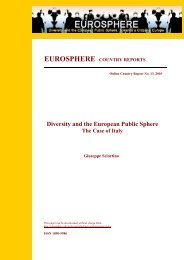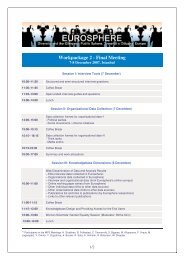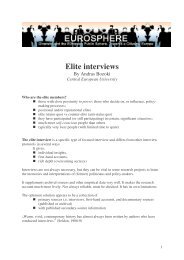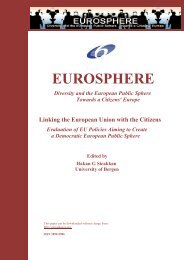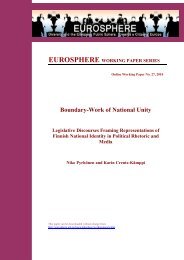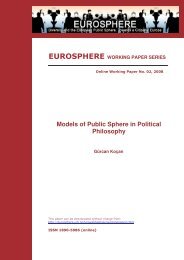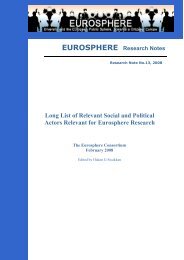Migrants, Minorities, Belongings and Citizenship. Glocalization and ...
Migrants, Minorities, Belongings and Citizenship. Glocalization and ...
Migrants, Minorities, Belongings and Citizenship. Glocalization and ...
You also want an ePaper? Increase the reach of your titles
YUMPU automatically turns print PDFs into web optimized ePapers that Google loves.
enefits in the state. 1 A claim of access to arenas <strong>and</strong> corporate benefits in the state is<br />
legitimate insofar as the claimants are directly affected by the citizenship structure <strong>and</strong><br />
as long as it does not opt for deconstructing an already inclusive structure. This new<br />
ontological frame both contains <strong>and</strong> supplements the assumptions of the former three<br />
ontologies.<br />
It is this comprehensive ontological frame that enables the diversity perspective to be a<br />
more adequate approach in today’s diverse societies. As the problems are related to<br />
citizens’ involvement, any design of a citizenship form <strong>and</strong> a public space model should<br />
address the issues of fixed <strong>and</strong> mobile individual <strong>and</strong> collective belongings <strong>and</strong> fixed <strong>and</strong><br />
mobile political <strong>and</strong> cultural boundaries. These mobilities <strong>and</strong> immobilities set individuals,<br />
groups, <strong>and</strong> the existing structures of citizenship apart; <strong>and</strong> they increasingly detach<br />
individuals from the existing public spaces. This process of increasing misalignments<br />
manifests itself as a decrease in citizen involvement. Mobilities set citizens <strong>and</strong><br />
citizenship structures apart because public spaces have fixed locations that require<br />
belonging to a place. Immobility of citizens sets them apart from citizenship structures<br />
because the political <strong>and</strong> cultural boundaries have now become mobile. The postulate<br />
that citizens can be educated to participate in politics <strong>and</strong> will someday ‘learn’ to come<br />
back to the existing public spaces is therefore not a realistic one. This project suggests<br />
instead designing new public spaces which can bring the public spaces to where citizens<br />
are rather than waiting for citizens to come where public spaces are. This presupposes<br />
mobile, multiple, composite civic public spaces which can accommodate diversity <strong>and</strong><br />
(im)mobility; <strong>and</strong> the “glocal spaces” may be the prototypes of such public spaces.<br />
Theoretical approach <strong>and</strong> conceptualization strategy in QC-CITKIT<br />
In the history of social sciences, citizenship theories facing new realities have revised<br />
their conceptual frameworks several times. Weber (1923) <strong>and</strong> Marshall (1950) described<br />
the first conceptual change as the demise of the class dimension in citizenship. Arendt<br />
(1976) described the second change as the rise of the Nation. The third change has been<br />
described by Habermas (1992, 1994a-b) as the decoupling of ‘citizenship’ from ‘nation’.<br />
The last development was actually the result of the ethical challenges posed by the<br />
suppressed situation of native ethnic <strong>and</strong> religious ‘minorities’ in the Western<br />
democracies. The emerging broader meaning of ‘citizenship’ extended the boundaries of<br />
demos in the citizenship theories to include also native ‘minorities’. However, through the<br />
principle of ius soli, both ‘nation’ <strong>and</strong> ‘citizenship’ became this time coupled with<br />
1 Sicakkan, H.G <strong>and</strong> Lithman, Y. (2004, forthcoming), “Theorizing <strong>Citizenship</strong>, Politics of Identity, <strong>and</strong> Modes<br />
of Belonging” in Envisioning Togethernes, Edwin Mellen Press, New York <strong>and</strong> London.<br />
35



